高中英语 外研版(2019)选择性必修四 Unit 1 Looking forwards Using language 课件(共50张)
文档属性
| 名称 | 高中英语 外研版(2019)选择性必修四 Unit 1 Looking forwards Using language 课件(共50张) | 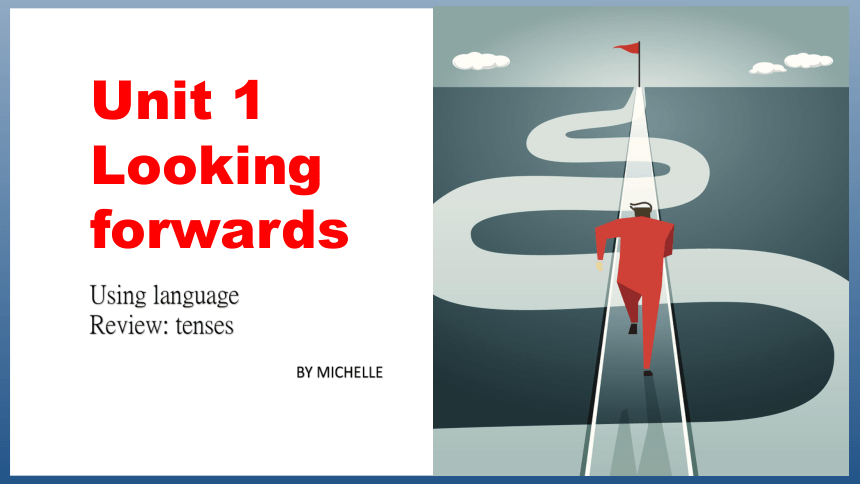 | |
| 格式 | pptx | ||
| 文件大小 | 13.3MB | ||
| 资源类型 | 教案 | ||
| 版本资源 | 外研版(2019) | ||
| 科目 | 英语 | ||
| 更新时间 | 2025-01-09 22:04:05 | ||
图片预览

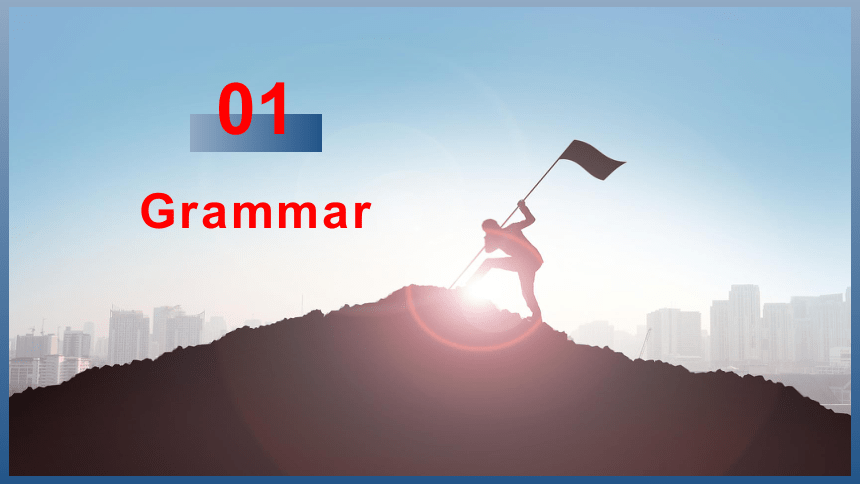
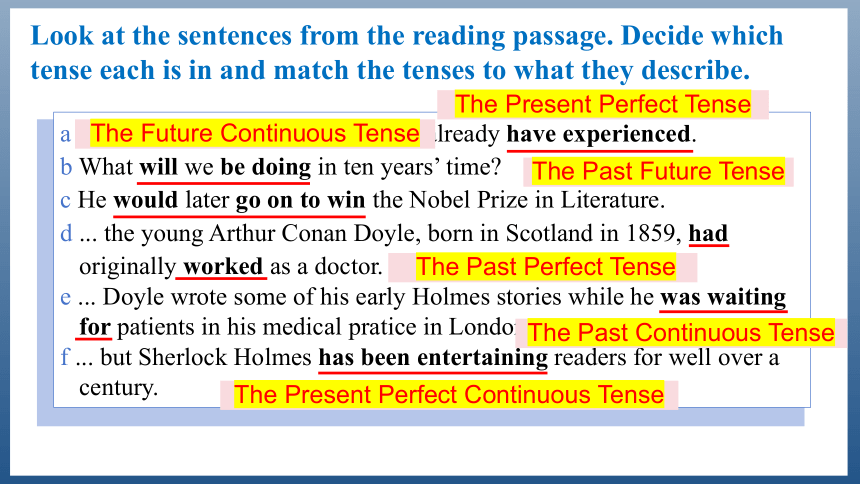
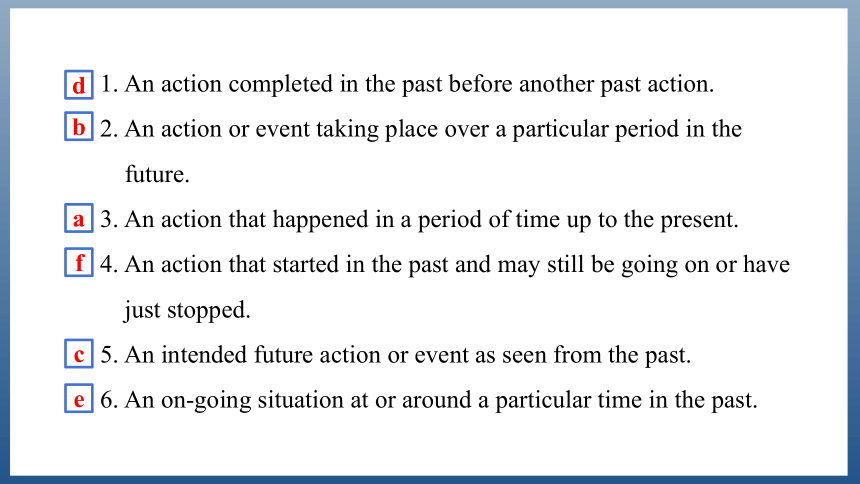
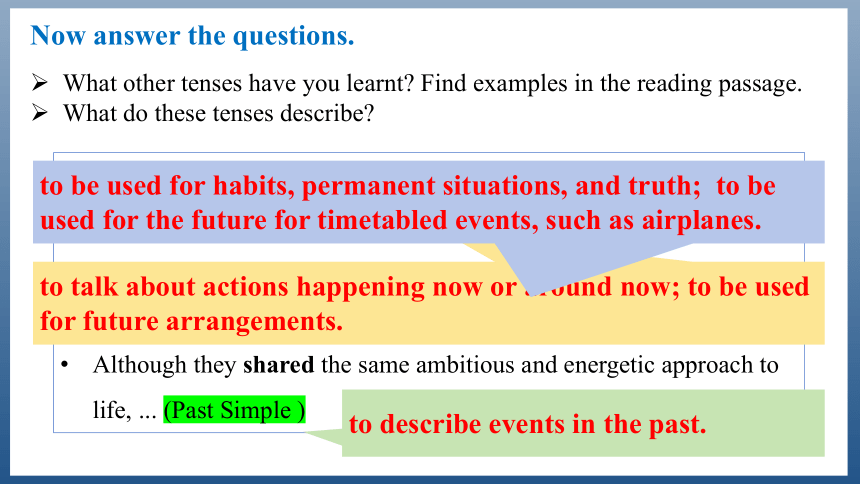
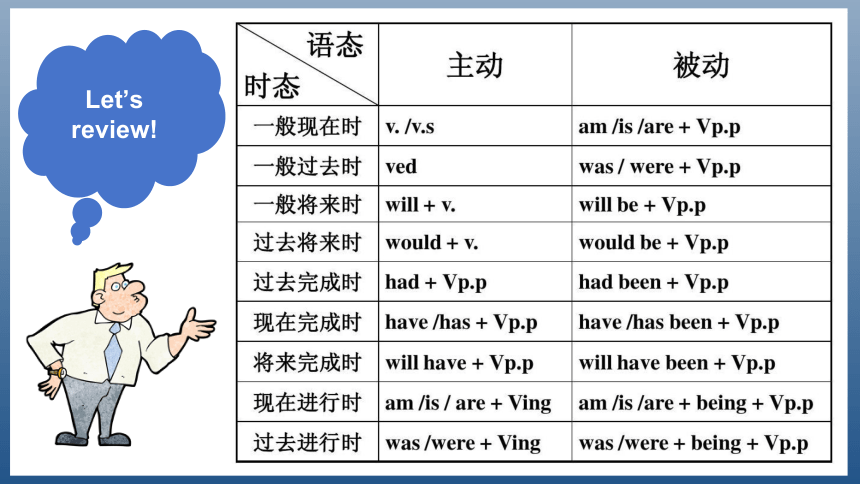


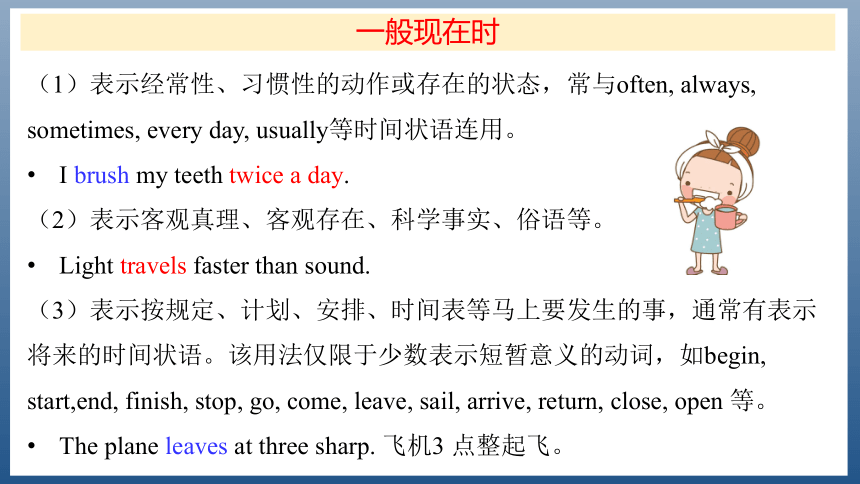
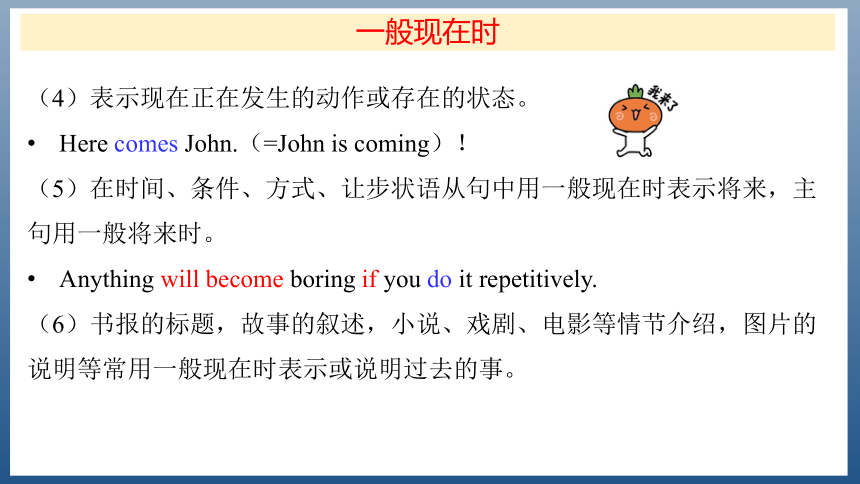
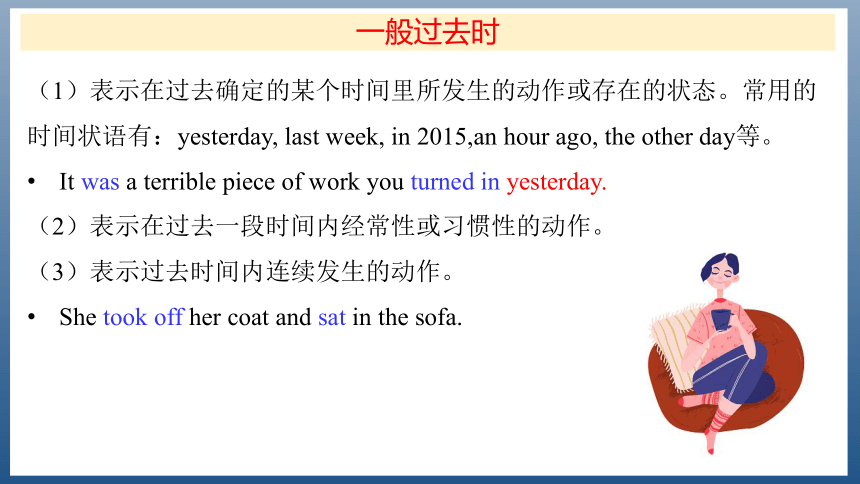

文档简介
(共50张PPT)
Unit 1
Looking
forwards
Using language
Review: tenses
BY MICHELLE
Grammar
01
Look at the sentences from the reading passage. Decide which tense each is in and match the tenses to what they describe.
a For many of us, it’s something we already have experienced.
b What will we be doing in ten years’ time
c He would later go on to win the Nobel Prize in Literature.
d ... the young Arthur Conan Doyle, born in Scotland in 1859, had
originally worked as a doctor.
e ... Doyle wrote some of his early Holmes stories while he was waiting
for patients in his medical pratice in London.
f ... but Sherlock Holmes has been entertaining readers for well over a
century.
The Present Perfect Tense
The Future Continuous Tense
The Past Future Tense
The Past Perfect Tense
The Past Continuous Tense
The Present Perfect Continuous Tense
1. An action completed in the past before another past action.
2. An action or event taking place over a particular period in the
future.
3. An action that happened in a period of time up to the present.
4. An action that started in the past and may still be going on or have
just stopped.
5. An intended future action or event as seen from the past.
6. An on-going situation at or around a particular time in the past.
d
b
a
f
c
e
Now answer the questions.
What other tenses have you learnt Find examples in the reading passage.
What do these tenses describe
One moment, we are lying comfortably in bed, about to fall into a deep sleep. (Present Continuous)
.... we find ourselves wondering or even worrying about possibly the most important issue of our life. (Present Simple)
Although they shared the same ambitious and energetic approach to life, ... (Past Simple )
to talk about actions happening now or around now; to be used for future arrangements.
to be used for habits, permanent situations, and truth; to be used for the future for timetabled events, such as airplanes.
to describe events in the past.
Let’s review!
Review: tenses
一般体
进行体
完成体
完成进行体
时态
一般现在时
一般过去时
一般将来时
过去将来时
现在进行时
过去进行时
将来进行时
现在完成时
过去完成时
现在完成进行时
将来完成时
01
一般时态的用法
一般现在时
一般将来时
一般过去时
过去将来时
一般现在时
(1)表示经常性、习惯性的动作或存在的状态,常与often, always, sometimes, every day, usually等时间状语连用。
I brush my teeth twice a day.
(2)表示客观真理、客观存在、科学事实、俗语等。
Light travels faster than sound.
(3)表示按规定、计划、安排、时间表等马上要发生的事,通常有表示将来的时间状语。该用法仅限于少数表示短暂意义的动词,如begin, start,end, finish, stop, go, come, leave, sail, arrive, return, close, open 等。
The plane leaves at three sharp. 飞机3 点整起飞。
一般现在时
(4)表示现在正在发生的动作或存在的状态。
Here comes John.(=John is coming)!
(5)在时间、条件、方式、让步状语从句中用一般现在时表示将来,主句用一般将来时。
Anything will become boring if you do it repetitively.
(6)书报的标题,故事的叙述,小说、戏剧、电影等情节介绍,图片的说明等常用一般现在时表示或说明过去的事。
一般过去时
(1)表示在过去确定的某个时间里所发生的动作或存在的状态。常用的时间状语有:yesterday, last week, in 2015,an hour ago, the other day等。
It was a terrible piece of work you turned in yesterday.
(2)表示在过去一段时间内经常性或习惯性的动作。
(3)表示过去时间内连续发生的动作。
She took off her coat and sat in the sofa.
一般过去时
(4)有些动作发生的时间没有具体表明,但实际上是“刚才,刚刚”发生的,应使用一般过去时,如 “I didn’ t know/expect...”或“I forgot...”等,表示事先不知道或不记得,但现在已经知道或记得的事情。
I didn’t expect to meet you here. 我没料到会在这里碰见你。
(5)在时间和条件状语从句中,若主句用了过去将来时,从句常用一般过去时代替过去将来时。
He said he would not go if it rained.
一般将来时
(1)“will/shall+动词原形”结构:表示客观上势必将发生的事情或临时做出的打算。shall一般用于第一人称,will可用于各种人称。常与next week, tomorrow, before long, in the future, later on, the day after tomorrow等时间状语连用。
I shall go to London tomorrow and return to Paris next week.
(2)“be going to+动词原形”结构:表示主观计划、打算做某事或根据某种迹象表明某事即将发生。
The Browns are going to move to Australia.
一般将来时
(3)be to do结构:表示计划、约定或按职责、义务必须做的事或即将发生的动作。它强调客观安排或受人指示而做某事。
I’m to see him today at 6 o’clock.
(4)be about to do结构:表示不久或即将发生的动作,一般不与时间状语连用。
The medical team is about to start.
(5)现在进行时表示将来:有这种用法的主要是一些短暂性动词,如go,come, leave, start, begin等,表示计划好或准备要做某事,很少变更。
My mother is coming to visit me next week.
过去将来时
(1)过去将来时由“would+动词原形”构成,表示从过去某一时间看将要发生的动作或存在的状态,常用于宾语从句或间接引语中。
She told us that she would not go with us, if it rained.
(2)过去将来时还可用was/were going to do, was/were to do, was/were about to do及过去进行时等方式表示。
02
进行时态的用法
现在进行时
将来进行时
过去进行时
现在进行时
(1)表示说话时正在进行的动作或存在的状态。
(2)表示现阶段一直在进行的动作,但此时此刻该动作不一定正在进行。
We are making model planes these days. 这些天我们在做飞机模型。
(3)表示此时此刻某一个动作不断地重复。
(4)表示按计划或安排将要发生的动作,常与一个表示将来的时间状语连用。
I am going on a trip soon. 我很快就要去旅行了。
现在进行时
(5)与always, usually, forever等连用表达生气、赞扬、好奇等感彩。
He is always helping others.他总是帮助别人。
(6)表示动作逐渐变化的过程,常用动词有get, come, go, leave, start, stop等。
His health is improving each day. 他的健康状况每天都在好转。
注意:下列动词不宜用进行时
感觉类,如look、smell、feel、sound、taste、see、hear等。
感情类,如like、love、prefer、admire、hate、fear等。
所有类,如have、contain、own、hold、belong to等。
过去进行时
(1)表示过去某一时刻或某一阶段正在进行的动作。
(2)与短暂性动词go, come, begin, arrive, start等连用,表示从过去某一时刻看即将发生的动作,多用于从句中。
She asked him whether he was coming back for supper.
(3)表示一个过去的动作正在进行时,另一个过去的动作发生了,常与when, while引导的时间状语从句连用。
He telephoned me when I was tidying my room.
过去进行时
(4)表示礼貌,不表示过去发生的动作,而表达现在的客气或礼貌。
I was thinking if you could finish your work this week.
(5)表示过去经常发生的动作,常与always, forever连用,带有一定的感彩。
(6)表示故事发生的背景。
It was a cold night. It was raining heavily outside. 那是一个寒冷的夜晚。当时外面正下着大雨。
将来进行时
(1)现在将来进行时是指从现在算起的将来某个时间正在进行的动作,或往往是已经做好安排,认为某事肯定会发生。
This time tomorrow I’ll be watching you play on TV.
(2)过去将来进行时表示就过去某一时间内而言,将来正在进行的动作,主要用于宾语从句中。
Doctor Wang said he would be giving another talk on this subject at the same time next week.
03
完成时态的用法
现在完成时
将来完成时
过去完成时
现在完成进行时
现在完成时
(1)表示“影响”:表示到现在为止动作已经发生或完成,但结果仍对现在有影响。
Look!Somebody has cleaned the sofa. 瞧,已经有人清洗了沙发。
(2)表示“完成”:过去开始的动作到现在已结束,或马上就要结束。
I have already searched the Internet but found nothing. 我已经在网上查过了,但什么都没找到。
(3)表示“经历”:表示从过去到现在经历过的事情,常与often, never, ever, only, twice, before,since等时间状语连用。
We have seen that film before.
现在完成时
(4)表示“持续”:表示过去某一动作或行为持续到现在,并有可能继续持续下去,常与“since+时间点”,“for+时间段”,so far、now、today、this week(month、year)、for a long time、in the past/last few years、these days等连用。
We have learnt 500 words these days.我们最近已经学习了500个单词了。
(5)在时间、条件状语从句中代替一般将来时。
I’ ll watch TV as soon as I’ ve finished my homework. 我一做完作业就看电视。
现在完成时
固定句型:
①It is/has been+时间段+since...表示“自从……以来已经……”。
It is/has been ten years since I graduated from the university.我已经从这所大学毕业十年了。
②This/It/That is the first/second/third...time(that)...表示“这/那是(某人)第几次做某事”,that从句中要用现在完成时。
This is the first time that I have been here.这是我第一次来这里。
过去完成时
(1)表示在过去某一时刻或动作之前已经完成的动作,即“过去的过去”。
He said that he had never seen such a beautiful bird before.
(2)表示开始于过去某一时间的动作或状态延续到过去另一时间,并有可能持续下去,常与for, since等词连用。
It had been very windy for a few hours and it had rained for two days. 风刮了好几个小时,雨已下了两天。
(3)表示“希望、打算、计划”的动词hope, think, expect, intend, mean等的过去完成时表示未曾实现的愿望、计划,意为“本想,本打算,本计划”等。
We had mearnt to go to your party yesterday, but we were too busy.
过去完成时
固定句型:
①表示“一……就……”的“hardly/scarcely...when...”“no sooner...than...”等句式中,主句常用过去完成时。
②“That/It was the+序数词+time+that从句”结构中。
③“It was+时间段+since从句”结构中。
将来完成时
表示将来某一时间之前完成的动作,并对将来产生一定的影响。
I will have lived in Shenzhen for 18 years by the year of 2028.
Will you have finished your work by the end of this month
You will have arrived at Shanghai by this time tomorrow.
现在完成进行时
(1)表示动作从过去某一时间开始一直延续到现在或离现在不远的时间,这一动作可能刚完成,也可能仍在进行。这种时态多用延续性动词。
We have been working on this project for over a month.
(2)现在完成进行时有时所表示的动作并不是一直在不停地进行,而是在断断续续地重复。这时现在完成进行时可用非延续性动词。
I have been ringing you several times in two days. 这两天内我给你打过几次电话。
(3)现在完成进行时有时可指“刚才”或“近来”发生的动作,往往暗示这个动作对现在的影响,和现在的情况有联系,常含有一种因果关系。
I feel a little tired because I have been playing basketball. 我有些累,我刚才一直在打篮球。
Complete the blog with the correct form of the verbs in brackets.
<
>
+
I woke at dawn again and already the birds 1 ___________ (sing). In the coming days, we 2 ________________ (paint) the toilet block that we had been building over the last two months.
I 3 _________________________ (live) in this Cambodian village for two months. Despite the hard physical work, I 4 _____________________________(not regret) for one moment choosing to spend my gap year as a volunteer for the Cambodia Foundation. It is wonderful to meet such friendly local people who are happy to share their lives with us.
were singing
would be painting
have been living / have lived
don’t regret / haven’t regretted
Complete the blog with the correct form of the verbs in brackets.
<
>
+
I 5__________ (feel) happy and free of worries. And of course, I 6 __________________________ (become) fitter. This gap year has been a fantastic opportunity for my personal growth, and I surely
7 ______________ (continue) to learn about how other people live their lives after it ends.
feel
have become / am becoming
will continue
Work in pairs. Read the profile and talk about David’s life using different tenses where appropriate.
David Mason
PERSONAL INFORMATION
Date of Birth 20 June 2001
Nationality British
EDUCATION
2007-2013 Carson Primary School
2013-2019 Wildwood High School
EXTRACURRICULAR EXPERIENCE
Sept 2017 first prize for school science project
Apr-Oct 2018 exchange programme in China
Jul 2019-present gap year in Cambodia
FUTURE PLANS
undergraduate study at Newcastle University
chemical engineer after graduation
voluntary work to help people in need
David Mason was born on 20 June in 2001.
He studied in Carson Primary School from 2007 to 2013.
He is going to do voluntary work to help people in need.
......
Work in pairs. Interview each other about your past experience and future plans. Share them with the class using different tenses where appropriate.
Vocabulary
Building
02
Choices and decisions
Read the conversation and answer the questions. Pay attention to the expressions in bold.
Jenny: What’s up, Li Ling You look worried.
Li Ling: I’m facing a difficult decision. I’ve been
recommended for admission to study physics at my dream university.
Jenny: Congratulations! But what do you mean by a difficult decision
Li Ling: Well, it sounds wonderful, but I had already decided to take the college entrance exam and apply to the Medical School there. I can’t make up my mind what the right thing to do is.
Jenny: I think it would be a great pity to pass up the opportunity to be admitted without taking the exam.
Li Ling: I know, but I have always wanted to study medicine and become a doctor. Physics is interesting, but it’s not my preferred major.
Jenny: Then why the indecision Go for your preferred major.
Li Ling: But what if I don’t do well enough in the exam to get into the Medical School I’m really having second thoughts.
Jenny: Can you put off making a decision until you’ve spoken to your high school advisor
Li Ling: I have already talked to her. She told me that I must decide what’s right for me now, and then go for it.
The problem is I don’t know what is right for me.
Jenny: Well, I wouldn’t reject anything out of hand.
Let’s go for lunch. Then we can weigh up the options and try to come to a decision.
What difficult decision is Li Ling facing Why is she feeling worried
What does Jenny suggest to her
What would you do when faced with a difficult decision
She has to make a choice between studying physics at her dream university, as she has been admitted without taking any exam, and taking the college entrance exam and applying to the Medical School there. She doesn’t know whether she can make the right decision.
Jenny at first suggested to Li Ling that she should go for her preferred major. Then she suggested that she could put off making a decision until she had spoken to her high school advisor. Since Li Ling still could not make a decision, Jenny suggested that they could go for lunch and then weigh up the options.
Possible answer: I will weigh up the possible options and turn to my parents and teachers for help before making the final decision.
Try to paraphrase the expressions in your own words.
1. make up one’s mind:
2. pass up the opportunity:
3. have second thoughts:
4. put off making a decision:
5. reject anything out of hand:
6. weigh up the options:
to determine to do something
to choose not to make use of an opportunity
to change one’s mind on second thought
to change making a decision to a later time
to resolutely refuse to do anything
to consider the options carefully before making a decision
Read the statements and complete the sentences with the correct form of the expressions in Activity 5.
1 May is .
2 Jane is .
3 Paul finds it easy to .
4 Bill is .
5 Amanda wants to .
6 Jia Ying has decided to .
having second thoughts
putting off making a decision
make up his mind
rejecting something out of hand
weigh up the options
pass up the opportunity
Listening&
Speaking
03
Read the passage and answer the questions.
It is crucial for teenagers to develop into mature and responsible members of society. In addition to participation in school, a part-time job can also be helpful in this transition. It can help them achieve new accomplishments, learn about society and become more independent.
Many countries now have laws to regulate part-time employment for students. In the UK, for example, the law states that students aged 15 and 16 are allowed to work a maximum of 12 hours per week during term time, and 35 hours per week during school holidays. They are not allowed to work before 7 am or after 7 pm.
What can students achieve via part-time jobs
Students can achieve new accomplishments, learn about society and become more independent, thus developing into mature and responsible members of society via part-time jobs.
What regulations are in place for students doing part-time jobs in the UK
In the UK, the law states that students aged 15 and 16 are allowed to work a maximum of 12 hours per week during term time, and 35 hours per week during school holidays. They are not allowed to work before 7 am or after 7 pm.
Have you ever had a part-time job Why did you do it
Listen to the interview and choose the job Richard applied for.
Listen again and complete the notes.
dealing with people
guiding visitors to local sites
as a lifeguard on the beach
worked selling food at a street stall
friendly
he is working hard to satisfy people
travel experiences
His previous work experience
desired to make the best use of
prepare him for his future college application
Now work in pairs. Decide whether Richard should get the job and give your reasons.
Complete the boxes with the expressions from the interview.
Would you mind … May I ask why …
The reason is … It’s because…
Could you tell me… I’d say it’s due to…
…, if you wouldn’t mind. Would you explain…
It’s a result of…
Asking polite questions
Giving reasons
Would you mind …
Could you tell me…
…, if you wouldn’t mind.
May I ask why…
Would you explain…
The reason is…
It’s because…
I’d say it’s due to…
It’s a result of…
Work in pairs. Choose a part-time job advertisement in Activity 8 and act out an interview using the expressions in this section.
Review the usage of tenses and do the relevant exercises.
Make up an interview using the words and expressions you’ve learnt today.
THANKS FOR WATCHING
Unit 1
Looking
forwards
Using language
Review: tenses
BY MICHELLE
Grammar
01
Look at the sentences from the reading passage. Decide which tense each is in and match the tenses to what they describe.
a For many of us, it’s something we already have experienced.
b What will we be doing in ten years’ time
c He would later go on to win the Nobel Prize in Literature.
d ... the young Arthur Conan Doyle, born in Scotland in 1859, had
originally worked as a doctor.
e ... Doyle wrote some of his early Holmes stories while he was waiting
for patients in his medical pratice in London.
f ... but Sherlock Holmes has been entertaining readers for well over a
century.
The Present Perfect Tense
The Future Continuous Tense
The Past Future Tense
The Past Perfect Tense
The Past Continuous Tense
The Present Perfect Continuous Tense
1. An action completed in the past before another past action.
2. An action or event taking place over a particular period in the
future.
3. An action that happened in a period of time up to the present.
4. An action that started in the past and may still be going on or have
just stopped.
5. An intended future action or event as seen from the past.
6. An on-going situation at or around a particular time in the past.
d
b
a
f
c
e
Now answer the questions.
What other tenses have you learnt Find examples in the reading passage.
What do these tenses describe
One moment, we are lying comfortably in bed, about to fall into a deep sleep. (Present Continuous)
.... we find ourselves wondering or even worrying about possibly the most important issue of our life. (Present Simple)
Although they shared the same ambitious and energetic approach to life, ... (Past Simple )
to talk about actions happening now or around now; to be used for future arrangements.
to be used for habits, permanent situations, and truth; to be used for the future for timetabled events, such as airplanes.
to describe events in the past.
Let’s review!
Review: tenses
一般体
进行体
完成体
完成进行体
时态
一般现在时
一般过去时
一般将来时
过去将来时
现在进行时
过去进行时
将来进行时
现在完成时
过去完成时
现在完成进行时
将来完成时
01
一般时态的用法
一般现在时
一般将来时
一般过去时
过去将来时
一般现在时
(1)表示经常性、习惯性的动作或存在的状态,常与often, always, sometimes, every day, usually等时间状语连用。
I brush my teeth twice a day.
(2)表示客观真理、客观存在、科学事实、俗语等。
Light travels faster than sound.
(3)表示按规定、计划、安排、时间表等马上要发生的事,通常有表示将来的时间状语。该用法仅限于少数表示短暂意义的动词,如begin, start,end, finish, stop, go, come, leave, sail, arrive, return, close, open 等。
The plane leaves at three sharp. 飞机3 点整起飞。
一般现在时
(4)表示现在正在发生的动作或存在的状态。
Here comes John.(=John is coming)!
(5)在时间、条件、方式、让步状语从句中用一般现在时表示将来,主句用一般将来时。
Anything will become boring if you do it repetitively.
(6)书报的标题,故事的叙述,小说、戏剧、电影等情节介绍,图片的说明等常用一般现在时表示或说明过去的事。
一般过去时
(1)表示在过去确定的某个时间里所发生的动作或存在的状态。常用的时间状语有:yesterday, last week, in 2015,an hour ago, the other day等。
It was a terrible piece of work you turned in yesterday.
(2)表示在过去一段时间内经常性或习惯性的动作。
(3)表示过去时间内连续发生的动作。
She took off her coat and sat in the sofa.
一般过去时
(4)有些动作发生的时间没有具体表明,但实际上是“刚才,刚刚”发生的,应使用一般过去时,如 “I didn’ t know/expect...”或“I forgot...”等,表示事先不知道或不记得,但现在已经知道或记得的事情。
I didn’t expect to meet you here. 我没料到会在这里碰见你。
(5)在时间和条件状语从句中,若主句用了过去将来时,从句常用一般过去时代替过去将来时。
He said he would not go if it rained.
一般将来时
(1)“will/shall+动词原形”结构:表示客观上势必将发生的事情或临时做出的打算。shall一般用于第一人称,will可用于各种人称。常与next week, tomorrow, before long, in the future, later on, the day after tomorrow等时间状语连用。
I shall go to London tomorrow and return to Paris next week.
(2)“be going to+动词原形”结构:表示主观计划、打算做某事或根据某种迹象表明某事即将发生。
The Browns are going to move to Australia.
一般将来时
(3)be to do结构:表示计划、约定或按职责、义务必须做的事或即将发生的动作。它强调客观安排或受人指示而做某事。
I’m to see him today at 6 o’clock.
(4)be about to do结构:表示不久或即将发生的动作,一般不与时间状语连用。
The medical team is about to start.
(5)现在进行时表示将来:有这种用法的主要是一些短暂性动词,如go,come, leave, start, begin等,表示计划好或准备要做某事,很少变更。
My mother is coming to visit me next week.
过去将来时
(1)过去将来时由“would+动词原形”构成,表示从过去某一时间看将要发生的动作或存在的状态,常用于宾语从句或间接引语中。
She told us that she would not go with us, if it rained.
(2)过去将来时还可用was/were going to do, was/were to do, was/were about to do及过去进行时等方式表示。
02
进行时态的用法
现在进行时
将来进行时
过去进行时
现在进行时
(1)表示说话时正在进行的动作或存在的状态。
(2)表示现阶段一直在进行的动作,但此时此刻该动作不一定正在进行。
We are making model planes these days. 这些天我们在做飞机模型。
(3)表示此时此刻某一个动作不断地重复。
(4)表示按计划或安排将要发生的动作,常与一个表示将来的时间状语连用。
I am going on a trip soon. 我很快就要去旅行了。
现在进行时
(5)与always, usually, forever等连用表达生气、赞扬、好奇等感彩。
He is always helping others.他总是帮助别人。
(6)表示动作逐渐变化的过程,常用动词有get, come, go, leave, start, stop等。
His health is improving each day. 他的健康状况每天都在好转。
注意:下列动词不宜用进行时
感觉类,如look、smell、feel、sound、taste、see、hear等。
感情类,如like、love、prefer、admire、hate、fear等。
所有类,如have、contain、own、hold、belong to等。
过去进行时
(1)表示过去某一时刻或某一阶段正在进行的动作。
(2)与短暂性动词go, come, begin, arrive, start等连用,表示从过去某一时刻看即将发生的动作,多用于从句中。
She asked him whether he was coming back for supper.
(3)表示一个过去的动作正在进行时,另一个过去的动作发生了,常与when, while引导的时间状语从句连用。
He telephoned me when I was tidying my room.
过去进行时
(4)表示礼貌,不表示过去发生的动作,而表达现在的客气或礼貌。
I was thinking if you could finish your work this week.
(5)表示过去经常发生的动作,常与always, forever连用,带有一定的感彩。
(6)表示故事发生的背景。
It was a cold night. It was raining heavily outside. 那是一个寒冷的夜晚。当时外面正下着大雨。
将来进行时
(1)现在将来进行时是指从现在算起的将来某个时间正在进行的动作,或往往是已经做好安排,认为某事肯定会发生。
This time tomorrow I’ll be watching you play on TV.
(2)过去将来进行时表示就过去某一时间内而言,将来正在进行的动作,主要用于宾语从句中。
Doctor Wang said he would be giving another talk on this subject at the same time next week.
03
完成时态的用法
现在完成时
将来完成时
过去完成时
现在完成进行时
现在完成时
(1)表示“影响”:表示到现在为止动作已经发生或完成,但结果仍对现在有影响。
Look!Somebody has cleaned the sofa. 瞧,已经有人清洗了沙发。
(2)表示“完成”:过去开始的动作到现在已结束,或马上就要结束。
I have already searched the Internet but found nothing. 我已经在网上查过了,但什么都没找到。
(3)表示“经历”:表示从过去到现在经历过的事情,常与often, never, ever, only, twice, before,since等时间状语连用。
We have seen that film before.
现在完成时
(4)表示“持续”:表示过去某一动作或行为持续到现在,并有可能继续持续下去,常与“since+时间点”,“for+时间段”,so far、now、today、this week(month、year)、for a long time、in the past/last few years、these days等连用。
We have learnt 500 words these days.我们最近已经学习了500个单词了。
(5)在时间、条件状语从句中代替一般将来时。
I’ ll watch TV as soon as I’ ve finished my homework. 我一做完作业就看电视。
现在完成时
固定句型:
①It is/has been+时间段+since...表示“自从……以来已经……”。
It is/has been ten years since I graduated from the university.我已经从这所大学毕业十年了。
②This/It/That is the first/second/third...time(that)...表示“这/那是(某人)第几次做某事”,that从句中要用现在完成时。
This is the first time that I have been here.这是我第一次来这里。
过去完成时
(1)表示在过去某一时刻或动作之前已经完成的动作,即“过去的过去”。
He said that he had never seen such a beautiful bird before.
(2)表示开始于过去某一时间的动作或状态延续到过去另一时间,并有可能持续下去,常与for, since等词连用。
It had been very windy for a few hours and it had rained for two days. 风刮了好几个小时,雨已下了两天。
(3)表示“希望、打算、计划”的动词hope, think, expect, intend, mean等的过去完成时表示未曾实现的愿望、计划,意为“本想,本打算,本计划”等。
We had mearnt to go to your party yesterday, but we were too busy.
过去完成时
固定句型:
①表示“一……就……”的“hardly/scarcely...when...”“no sooner...than...”等句式中,主句常用过去完成时。
②“That/It was the+序数词+time+that从句”结构中。
③“It was+时间段+since从句”结构中。
将来完成时
表示将来某一时间之前完成的动作,并对将来产生一定的影响。
I will have lived in Shenzhen for 18 years by the year of 2028.
Will you have finished your work by the end of this month
You will have arrived at Shanghai by this time tomorrow.
现在完成进行时
(1)表示动作从过去某一时间开始一直延续到现在或离现在不远的时间,这一动作可能刚完成,也可能仍在进行。这种时态多用延续性动词。
We have been working on this project for over a month.
(2)现在完成进行时有时所表示的动作并不是一直在不停地进行,而是在断断续续地重复。这时现在完成进行时可用非延续性动词。
I have been ringing you several times in two days. 这两天内我给你打过几次电话。
(3)现在完成进行时有时可指“刚才”或“近来”发生的动作,往往暗示这个动作对现在的影响,和现在的情况有联系,常含有一种因果关系。
I feel a little tired because I have been playing basketball. 我有些累,我刚才一直在打篮球。
Complete the blog with the correct form of the verbs in brackets.
<
>
+
I woke at dawn again and already the birds 1 ___________ (sing). In the coming days, we 2 ________________ (paint) the toilet block that we had been building over the last two months.
I 3 _________________________ (live) in this Cambodian village for two months. Despite the hard physical work, I 4 _____________________________(not regret) for one moment choosing to spend my gap year as a volunteer for the Cambodia Foundation. It is wonderful to meet such friendly local people who are happy to share their lives with us.
were singing
would be painting
have been living / have lived
don’t regret / haven’t regretted
Complete the blog with the correct form of the verbs in brackets.
<
>
+
I 5__________ (feel) happy and free of worries. And of course, I 6 __________________________ (become) fitter. This gap year has been a fantastic opportunity for my personal growth, and I surely
7 ______________ (continue) to learn about how other people live their lives after it ends.
feel
have become / am becoming
will continue
Work in pairs. Read the profile and talk about David’s life using different tenses where appropriate.
David Mason
PERSONAL INFORMATION
Date of Birth 20 June 2001
Nationality British
EDUCATION
2007-2013 Carson Primary School
2013-2019 Wildwood High School
EXTRACURRICULAR EXPERIENCE
Sept 2017 first prize for school science project
Apr-Oct 2018 exchange programme in China
Jul 2019-present gap year in Cambodia
FUTURE PLANS
undergraduate study at Newcastle University
chemical engineer after graduation
voluntary work to help people in need
David Mason was born on 20 June in 2001.
He studied in Carson Primary School from 2007 to 2013.
He is going to do voluntary work to help people in need.
......
Work in pairs. Interview each other about your past experience and future plans. Share them with the class using different tenses where appropriate.
Vocabulary
Building
02
Choices and decisions
Read the conversation and answer the questions. Pay attention to the expressions in bold.
Jenny: What’s up, Li Ling You look worried.
Li Ling: I’m facing a difficult decision. I’ve been
recommended for admission to study physics at my dream university.
Jenny: Congratulations! But what do you mean by a difficult decision
Li Ling: Well, it sounds wonderful, but I had already decided to take the college entrance exam and apply to the Medical School there. I can’t make up my mind what the right thing to do is.
Jenny: I think it would be a great pity to pass up the opportunity to be admitted without taking the exam.
Li Ling: I know, but I have always wanted to study medicine and become a doctor. Physics is interesting, but it’s not my preferred major.
Jenny: Then why the indecision Go for your preferred major.
Li Ling: But what if I don’t do well enough in the exam to get into the Medical School I’m really having second thoughts.
Jenny: Can you put off making a decision until you’ve spoken to your high school advisor
Li Ling: I have already talked to her. She told me that I must decide what’s right for me now, and then go for it.
The problem is I don’t know what is right for me.
Jenny: Well, I wouldn’t reject anything out of hand.
Let’s go for lunch. Then we can weigh up the options and try to come to a decision.
What difficult decision is Li Ling facing Why is she feeling worried
What does Jenny suggest to her
What would you do when faced with a difficult decision
She has to make a choice between studying physics at her dream university, as she has been admitted without taking any exam, and taking the college entrance exam and applying to the Medical School there. She doesn’t know whether she can make the right decision.
Jenny at first suggested to Li Ling that she should go for her preferred major. Then she suggested that she could put off making a decision until she had spoken to her high school advisor. Since Li Ling still could not make a decision, Jenny suggested that they could go for lunch and then weigh up the options.
Possible answer: I will weigh up the possible options and turn to my parents and teachers for help before making the final decision.
Try to paraphrase the expressions in your own words.
1. make up one’s mind:
2. pass up the opportunity:
3. have second thoughts:
4. put off making a decision:
5. reject anything out of hand:
6. weigh up the options:
to determine to do something
to choose not to make use of an opportunity
to change one’s mind on second thought
to change making a decision to a later time
to resolutely refuse to do anything
to consider the options carefully before making a decision
Read the statements and complete the sentences with the correct form of the expressions in Activity 5.
1 May is .
2 Jane is .
3 Paul finds it easy to .
4 Bill is .
5 Amanda wants to .
6 Jia Ying has decided to .
having second thoughts
putting off making a decision
make up his mind
rejecting something out of hand
weigh up the options
pass up the opportunity
Listening&
Speaking
03
Read the passage and answer the questions.
It is crucial for teenagers to develop into mature and responsible members of society. In addition to participation in school, a part-time job can also be helpful in this transition. It can help them achieve new accomplishments, learn about society and become more independent.
Many countries now have laws to regulate part-time employment for students. In the UK, for example, the law states that students aged 15 and 16 are allowed to work a maximum of 12 hours per week during term time, and 35 hours per week during school holidays. They are not allowed to work before 7 am or after 7 pm.
What can students achieve via part-time jobs
Students can achieve new accomplishments, learn about society and become more independent, thus developing into mature and responsible members of society via part-time jobs.
What regulations are in place for students doing part-time jobs in the UK
In the UK, the law states that students aged 15 and 16 are allowed to work a maximum of 12 hours per week during term time, and 35 hours per week during school holidays. They are not allowed to work before 7 am or after 7 pm.
Have you ever had a part-time job Why did you do it
Listen to the interview and choose the job Richard applied for.
Listen again and complete the notes.
dealing with people
guiding visitors to local sites
as a lifeguard on the beach
worked selling food at a street stall
friendly
he is working hard to satisfy people
travel experiences
His previous work experience
desired to make the best use of
prepare him for his future college application
Now work in pairs. Decide whether Richard should get the job and give your reasons.
Complete the boxes with the expressions from the interview.
Would you mind … May I ask why …
The reason is … It’s because…
Could you tell me… I’d say it’s due to…
…, if you wouldn’t mind. Would you explain…
It’s a result of…
Asking polite questions
Giving reasons
Would you mind …
Could you tell me…
…, if you wouldn’t mind.
May I ask why…
Would you explain…
The reason is…
It’s because…
I’d say it’s due to…
It’s a result of…
Work in pairs. Choose a part-time job advertisement in Activity 8 and act out an interview using the expressions in this section.
Review the usage of tenses and do the relevant exercises.
Make up an interview using the words and expressions you’ve learnt today.
THANKS FOR WATCHING
